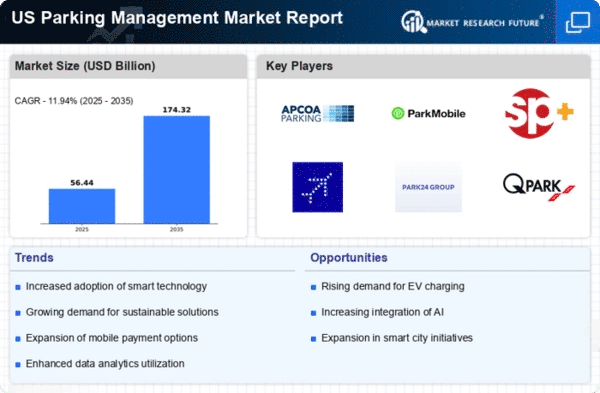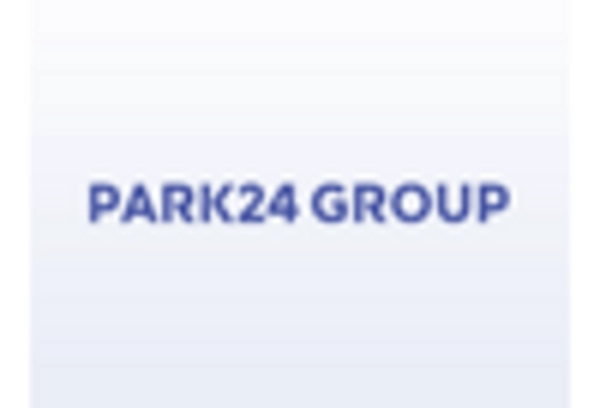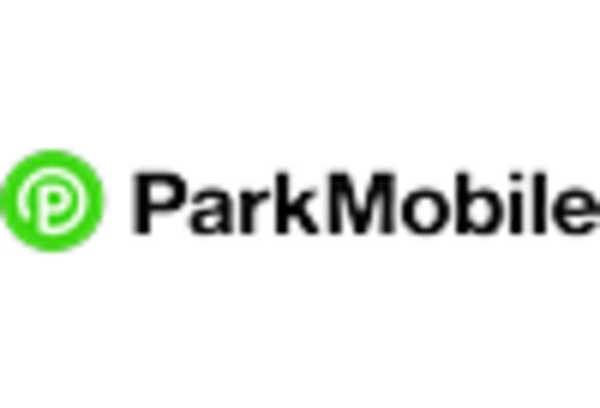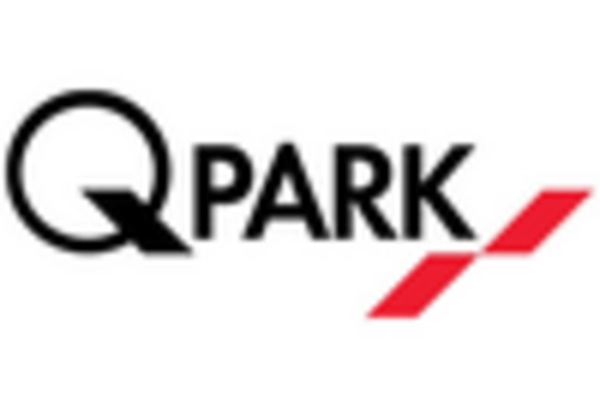Government Regulations and Policies
Government regulations and policies play a crucial role in shaping the parking management market. Local and state governments are increasingly implementing policies aimed at improving urban mobility and reducing congestion. For instance, initiatives promoting the use of electric vehicles (EVs) are leading to the establishment of dedicated parking spaces and charging stations. The U.S. Department of Transportation has allocated over $1 billion in grants to support such initiatives. Additionally, zoning laws are evolving to require new developments to include adequate parking solutions. These regulatory frameworks are likely to drive innovation and investment in the parking management market, as stakeholders seek to comply with new standards and enhance service offerings.
Urbanization and Increased Vehicle Ownership
The trend of urbanization in the United States is significantly impacting the parking management market. As more individuals migrate to urban areas, the demand for parking spaces is escalating. The U.S. Census Bureau reports that urban populations are projected to increase by approximately 10% over the next decade. This surge in urban residents correlates with a rise in vehicle ownership, which is expected to reach 300 million by 2025. Consequently, parking management solutions must adapt to accommodate this growing demand. The need for efficient parking systems is becoming critical, as cities strive to manage limited space effectively while ensuring accessibility for residents and visitors alike.
Rising Demand for Sustainable Parking Solutions
There is a growing demand for sustainable parking solutions. As environmental concerns gain prominence, stakeholders are increasingly seeking ways to reduce their carbon footprint. This trend is reflected in the rising popularity of green parking facilities, which incorporate eco-friendly technologies such as solar panels and permeable paving. According to industry estimates, the market for sustainable parking solutions is expected to grow by 15% annually through 2027. Furthermore, cities are implementing policies that incentivize the development of sustainable parking infrastructure. This shift towards sustainability is likely to influence the parking management market, as operators strive to meet the expectations of environmentally conscious consumers.
Technological Advancements in Parking Solutions
The parking management market is experiencing a notable transformation due to rapid technological advancements. Innovations such as mobile applications, automated payment systems, and real-time parking availability tracking are becoming increasingly prevalent. These technologies enhance user experience and streamline operations for parking facility operators. According to recent data, the integration of smart technologies in parking management can potentially reduce operational costs by up to 30%. Furthermore, the adoption of Internet of Things (IoT) devices is expected to grow, with projections indicating that the market for IoT in parking management could reach $2 billion by 2026. This shift towards technology-driven solutions is likely to reshape the parking management market, making it more efficient and user-friendly.
Integration of Parking Management with Urban Mobility Solutions
The integration of parking management with broader urban mobility solutions is emerging as a key driver in the parking management market. As cities seek to enhance transportation efficiency, there is a growing emphasis on creating seamless connections between parking facilities and public transit systems. This integration can facilitate better access to parking spaces and reduce congestion in urban areas. Recent studies indicate that cities that implement integrated mobility solutions can experience a reduction in traffic congestion by up to 20%. As a result, stakeholders in the parking management market are increasingly collaborating with public transit authorities to develop comprehensive mobility strategies that enhance user experience and promote sustainable transportation options.
















